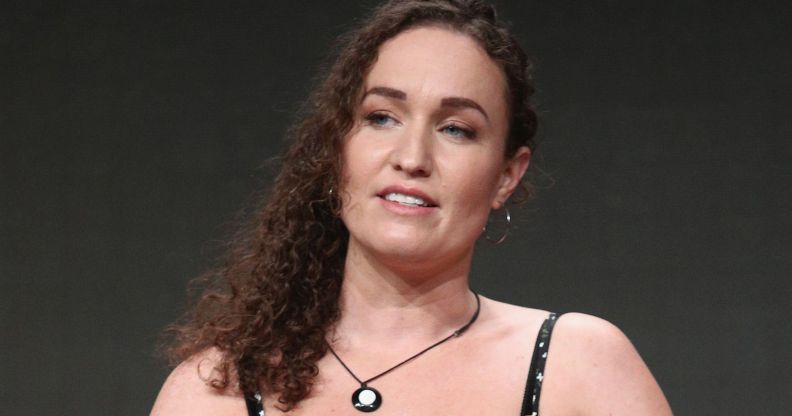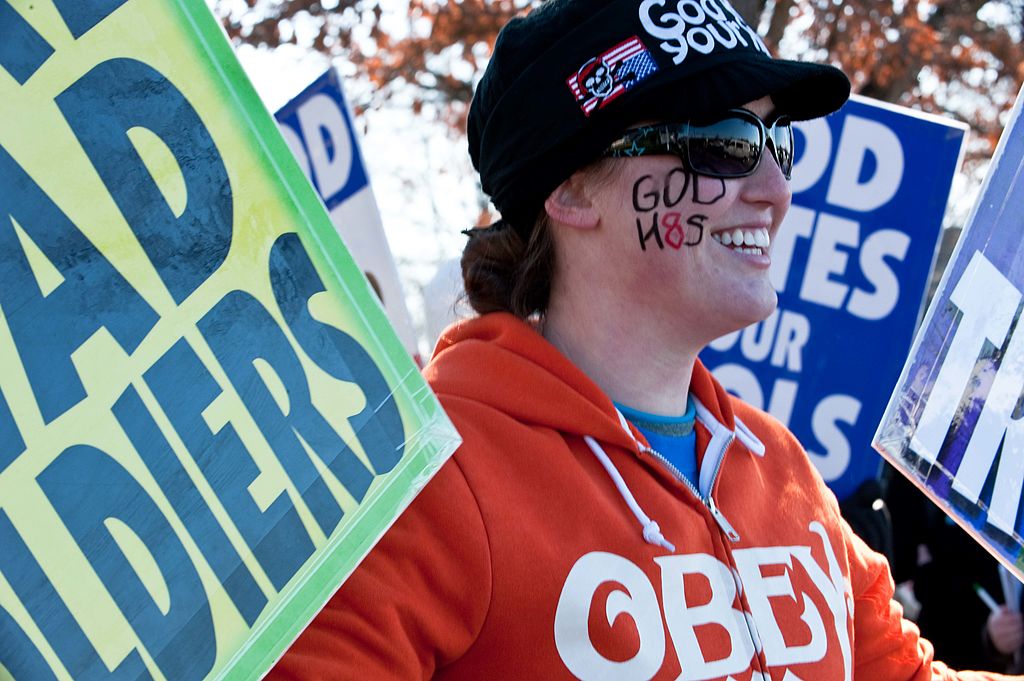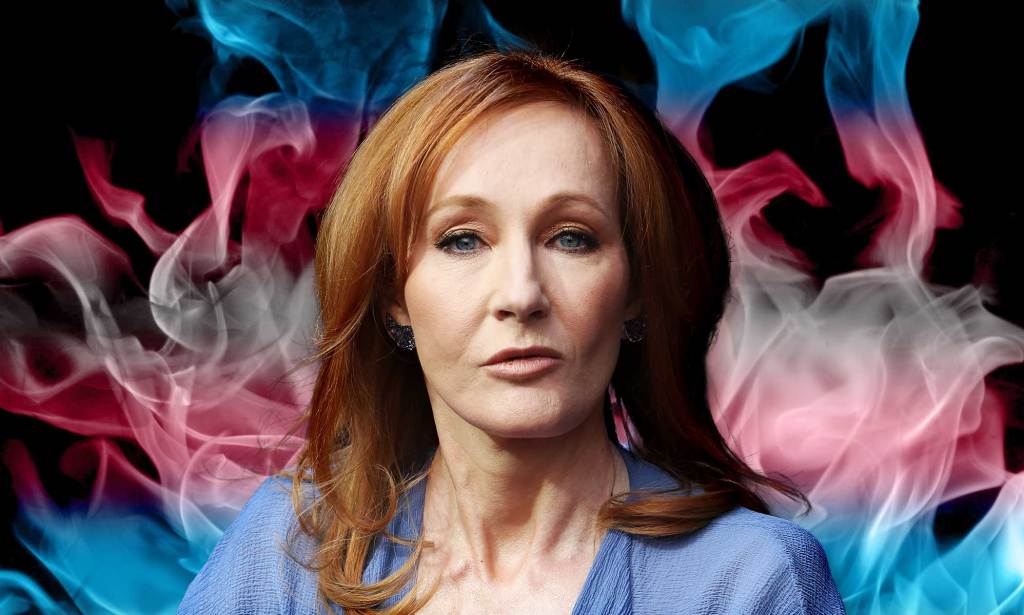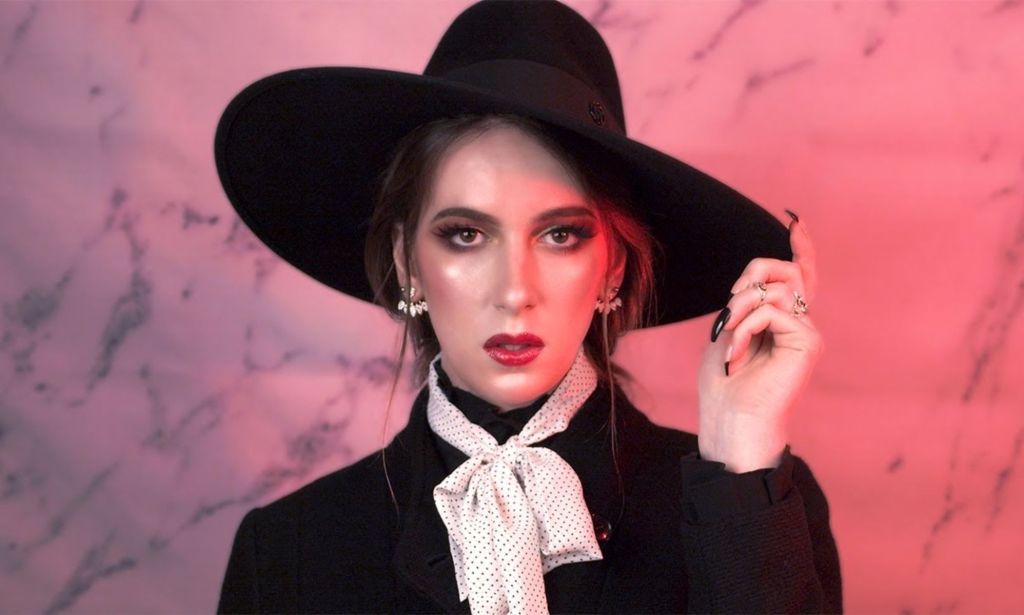How ex-Westboro Baptist Church member Megan Phelps-Roper ended up hosting a JK Rowling podcast

Megan Phelps-Roper has been critical of the anti LGBTQ+ Westboro Baptist Church since leaving in 2012. (Getty)
A decade after leaving the extremist Christian hate group the Westboro Baptist Church, Megan Phelps-Roper is back in the spotlight once more as the host of new podcast series The Witch Trials of JK Rowling.
Phelps-Roper, who was born into the infamous anti-gay church in Kansas and was one of its most prominent public figures before she sensationally disavowed the group in 2012, has spent the last 10 years as a critic of her former church, which is notorious for picketing the funerals of Aids victims and US soldiers with placards featuring slogans like ‘God Hates Fags’.
Now an author and public speaker, Phelps-Roper is currently fronting a new podcast series which sees her interview Harry Potter author JK Rowling about her views on gender and the firestorm of controversy they have elicited over the last three years.
Who is Megan Phelps-Roper?
Megan Phelps-Roper was born on 31 January, 1986. Her mother is Westboro Baptist Church member Shirley Phelps-Roper and her grandfather was Fred Phelps, who founded the Westboro Baptist Church in 1955 and who died in 2014 at the age of 84.
Megan Phelps-Roper was raised in Topeka, Kansas in the Westboro Baptist Church’s compound with other members of her family and church, where she was brought up to believe in the church’s extremist ideology.
She participated in her first Westboro Baptist Church demonstration when she was just five years old, regularly attending picketing lines during her childhood, including protests related to the homophobic killing of college student Matthew Shepard and the 9/11 attacks.
At 13, she was baptised into the Westboro Baptist Church by her grandfather, Fred. She later studied at Washburn University before taking a an admin job at her family’s law firm, Phelps Chartered.

After joining Twitter in 2008, Phelps-Roper began to use the social media platform to espouse the church’s hateful teachings, regularly attacking Jewish and LGBTQ+ people.
In 2011, she appeared with other family members on Louis Theroux’s documentary America’s Most Hated Family in Crisis.
In 2019, Phelps-Roper explained how she was able to study at a mainstream school and college and mingle with people who weren’t members of Westboro Baptist Church during her youth without questioning her own extremist views.
“The vast majority of people in the church are people who grew up in it, so they were indoctrinated, just like I was,” Phelps-Roper told PBS.
When did she leave the Westboro Baptist Church?
Megan Phelps-Roper left the Westboro Baptist Church in 2012 with her younger sister Grace, announcing her exit from the group publicly in 2013 after it emerged that her former church was planning to protest the funerals of victims of the Sandy Hook elementary school shooting.
She later explained that interacting with non-Westboro Baptist Church members on Twitter had led her to begin questioning the church’s views, citing exchanges with Jewish Twitter user David Abitbol, who had pointed out inconsistencies in the group’s belief system.
Phelps-Roper had also become disillusioned with the internal workings of the Westboro Baptist Church after it introduced a council of all-male elders to make decisions for the group.
Since leaving the church, Phelps-Roper has apologised for her past actions, stating that she is “not religious” anymore and that she is using her work as an author and speaker for “healing and change and to try and repair some of that damage.” She has attempted to challenge the views of remaining church members on Twitter and in private letters.
Phelps-Roper, along with her sister Grace and other former members, have been estranged from their Westboro family members ever since leaving the church, despite their attempts to make contact.
“My family, they cannot have anything to do with us”, Phelps-Roper told PBS in 2019. “They believe that their duty is to deliver me to Satan for the destruction of the flesh.”
Asked whether she still loves her relatives that remain in the church, she replied: “I do, absolutely. And I’m sure they are frustrated with how I show that love now, and that I’m out here basically trying to dismantle this thing they have come to build. But I do. I love, I care about them.”
What has Megan Phelps-Roper done since leaving the church?
Since leaving the Westboro Baptist Church, Megan Phelps-Roper has carved out a career as an author and public speaker. A 2017 TED Talk about her experiences has amassed more than 6.5 million views on YouTube.
In 2019, the writer released a memoir, Unfollow, which detailed her upbringing and decision to leave the church.
That same year, she appeared in another Louis Theroux documentary about the Westboro Baptist Church entitled Surviving America’s Most Hated Family.
She currently lives in South Dakota with her husband, Chad Fjelland, and their two children; daughter Sølvi Lynne, who was born in 2018, and Tor Bjørn, who was born in October 2022.
Why is Megan Phelps-Roper hosting The Witch Trials of JK Rowling podcast?
In February 2023, Phelps-Roper announced that she would be hosting a new podcast series in which she spoke to Harry Potter author JK Rowling about her views on gender and the controversy surrounding them.
Announcing the The Witch Trials of JK Rowling on Twitter on Tuesday, 14 February, Phelps-Roper revealed she wrote to Rowling last year inviting her to “be part of a conversation seeking to understand her perspective and those of her critics”.
The podcast host added: “As someone with deep roots in extremism, rescued by the good will of those who engaged me: I know the value of good-faith conversation in bridging the deepest divides. Even – and especially – when it feels dangerous.”
A follow-up tweet from Phelps-Roper promoting the first episode teased: “How do you know if you’re standing up for what’s right – or joining a moral panic?”

Episodes aired so far have seen JK Rowling attempt to justify her online posts about trans equality, with the author stating: “Time will tell whether I’ve got this wrong. I can only say that I’ve thought about it deeply and hard and long. And I’ve listened, I promise, to the other side.”
She added: “And I believe, absolutely, that there is something dangerous about this movement, and it must be challenged.”
The framing of The Witch Trials of JK Rowling, which has centred Rowling’s own experiences of online hate and abuse, has led to criticism of the series from many LGBTQ+ people, and even those who were invited to lend their voice to the series.
Natalie Wynn, known on YouTube as ContraPoints, was interviewed by Phelps-Roper for the series about her experiences as a trans person, but wrote on Twitter ahead of the podcast’s premiere that her participation was a “a serious lapse in judgment”.

“[Phelps-Roper] thinks this way because of her experience leaving the [Westboro Baptist Church],” Wynn argued. “She’s extrapolated an entire political worldview: the basic problem facing humanity is too much ‘polarisation’.
“Megan does not seem to grasp that trans people are fighting for our lives, our right to exist in society.”
Wynn concluded by saying: “I regret my participation and would not have participated had I fully understood the nature of the project.
“I feel I’ve been used and I share the sentiments of other trans people who are speaking out against it.”
Megan Phelps-Roper told PinkNews it “pained her” that Wynn felt this way, but added: “I think I understand where she’s coming from.:
The podcast presenter continued: “She appears to be extrapolating from an understandable misreading of the show’s title, but the series we’re making is full of complex questions and stories – including from many LGBTQ+ people – rather than conclusions and justifications.
“I know that withholding judgment is not an easy thing to do, but I believe that if she listens to the show through its end, she will see that it isn’t what she fears it to be.”
How did this story make you feel?

